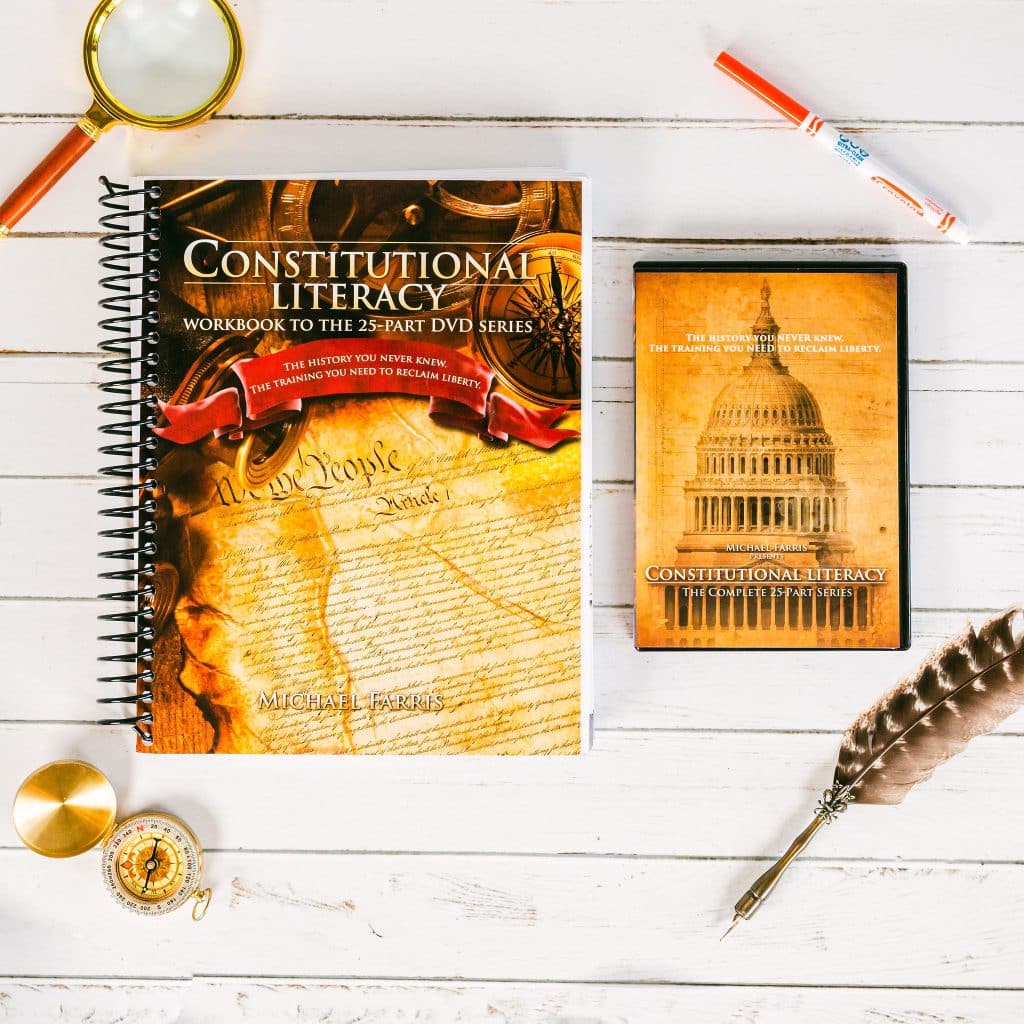
7 Steps to Raising an American Patriot
What images come into your mind when you think of patriotism in the United States of America? Baseball, hotdogs, apple pie or Chevrolet? Parades, weekend barbeques, lines to the voting booth or standing for the red, white and blue? Maybe this question is frustrating to consider because of the divisive conversations and political polarization that plague the current news cycle. Are you becoming apathetic and losing hope due to the postmodern and post-Christian era in which we now find ourselves living?
As you homeschool your children this summer, and as we approach the July 4th holiday, are you asking yourself this question: How can I raise my kids to be American patriots? Let’s start with a basic question. What is patriotism? Patriotism is a sense of love, loyalty, and devotion toward one’s country.
It is the emotional attachment and dedication that individuals feel toward their homeland, its values, culture, history and people. Patriotism often involves a deep sense of pride and willingness to support and defend one’s country, its ideals and its interests. Patriotism can manifest in various ways, such as displaying national symbols, participating in civic activities, respecting and upholding the laws of the land, serving in the military or contributing to the overall welfare and progress of the nation. It is often associated with a strong sense of national identity and can be an important part of a country’s social fabric, fostering unity and a shared sense of belonging among its citizens.
It is important, however, to note that patriotism can take different forms and be expressed differently by individuals. It is not inherently exclusionary or hostile toward other nations or cultures. Patriotism should ideally promote a healthy appreciation for one’s own country while also respecting the diversity and interconnectedness of the global community.
How did our forefathers think and talk about patriotism? The first thing that comes to my mind is President Abraham Lincoln’s Gettysburg Address. It’s short (not even 300 words) and powerful, so I am including it in its entirety.
Four score and seven years ago our fathers brought forth on this continent, a new nation, conceived in Liberty, and dedicated to the proposition that all men are created equal. Now we are engaged in a great civil war, testing whether that nation, or any nation so conceived and so dedicated, can long endure. We are met on a great battlefield of that war. We have come to dedicate a portion of that field, as a final resting place for those who here gave their lives that that nation might live. It is altogether fitting and proper that we should do this.But, in a larger sense, we can not dedicate – we can not consecrate – we can not hallow – this ground. The brave men, living and dead, who struggled here, have consecrated it, far above our poor power to add or detract. The world will little note, nor long remember what we say here, but it can never forget what they did here. It is for us the living, rather, to be dedicated here to the unfinished work which they who fought here have thus far so nobly advanced. It is rather for us to be here dedicated to the great task remaining before us – that from these honored dead we take increased devotion to that cause for which they gave the last full measure of devotion – that we here highly resolve that these dead shall not have died in vain – that this nation, under God, shall have a new birth of freedom – and that government of the people, by the people, for the people, shall not perish from the earth.
– Abraham Lincoln, Gettysburg Address
Lincoln’s speech challenges us that remembering is not enough. We have a much greater task. We must resolve that the honored dead shall not have died in vain. If we are resolved in this way, then how will it be shown?
In a world of identity politics, what is our national identity? Let me key in on the word united in the United States of America. What unites us? What is the glue that holds us together? What binds us together as citizens of the United States of America? Is it a common national purpose? Is it a similar lifestyle we share within our family, neighborhood or tribe? Is it our love for the winning sports team in our city? Is it the political bent of our state? Is there anything that can unite 330 million people living in 50 states, thousands of cities, and over forty-thousand zip codes?
Think of a classic war movie. What is typically depicted? We meet the soldier from Brooklyn with his comrades from southern Mississippi, western Texas, Indiana and northern Minnesota. Five very different accents, cultures, backgrounds, political persuasions, skin tones and religious beliefs, but they are all Americans fighting for a single cause. Liberty.
As Americans, we have a shared history, and I suspect we have shared hopes and dreams for ourselves and our posterity. Yes, the fabric may be fraying. And I won’t ignore the fact that we are witnessing public fights and deteriorating levels of trust. But freedom still rings in many parts of our great country. And I believe God intervenes in the affairs of men and nations. I pray that He redeems what is broken in our country, and I pray we do our part to be good citizens, then rely on God for the results.
If you’re still with me, then let’s get practical. How can you instill patriotism in your children? This is a big and important task for parents. It involves fostering a sense of love, loyalty and connection to our country.
Here are seven steps you can take to nurture patriotism in your home.
1. Education
Provide young students with a comprehensive understanding of our country’s history, culture, values and achievements to help cultivate a sense of pride and attachment. Encourage the study of national literature, history and civics to contribute to a deeper appreciation of one’s country.
2. National Symbols and Traditions
Promote the use and display of national symbols, such as flags, anthems and important historical artifacts. Celebrate national holidays and traditions, as they reinforce a sense of shared identity and belonging. As an example, our family would stand up, put our right hand over our hearts and recite the pledge of allegiance to start a homeschool day.
3. Civic Engagement
Encourage active participation in civic activities and the democratic process. Lead by example. Volunteering, voting, and engaging in community service projects can instill a sense of ownership and responsibility toward the betterment of one’s country. Our oldest son participated in Civil Air Patrol and marched as part of the color guard in our town’s annual Fourth of July parade.
4. International Travel
Visit elsewhere. It may surprise you, but visiting other countries is a great way to appreciate being an American. Being exposed to perspectives outside of the good ol’ USA can enhance appreciation for one’s own heritage.
5. Respecting Forefathers
Highlight the contributions and achievements of individuals who exemplify patriotism: respected leaders, scholars, artists, philanthropists and our country’s forefathers. These role models can inspire others and serve as examples of how love for one’s country can be expressed through positive actions.
6. Commemoration and Remembrance
Honor the sacrifices and contributions made by previous generations. Paying tribute to national heroes, veterans and those who have served our country can instill a sense of gratitude and pride in the collective history of our nation. Celebrate our national patriotic holidays, including Memorial Day, Veterans Day and Independence Day.
7. Respect
Embrace the diversity within our country. America has been called a melting pot, the connotation that although we respect the variety of subcultures, religions, ethnicities and opinions – we are still “one nation under God” and all “yearning to breathe free.”
I’ll close with the preamble to the Declaration of Independence, dated July 4, 1776:
We hold these truths to be self-evident, that all men are created equal, that they are endowed by their Creator with certain unalienable Rights, that among these are Life, Liberty and the pursuit of Happiness. That to secure these rights, Governments are instituted among Men, deriving their just powers from the consent of the governed, that whenever any Form of Government becomes destructive of these ends, it is the Right of the People to alter or to abolish it, and to institute new Government, laying its foundation on such principles and organizing its powers in such form, as to them shall seem most likely to affect their Safety and Happiness.
As for me, I love the USA, the republic for which our flag stands.
Equip Your Children to Be Constitutionally Literate
While we are on the subject of Patriotism, you can prepare your students to begin their voting careers as informed citizens, well-versed in the content and meaning of the United States Constitution. Apologia publishes Constitutional Literacy by Michael Farris. Farris, a lawyer, founder of Home School Legal Defense Association and Patrick Henry College and the former CEO of Alliance Defending Freedom. This course includes 25 lessons plus a workbook and features over 500 minutes of engaging video instruction by Farris. Join constitutional expert Michael Farris as he walks your family through the history, theory, and application of the Constitution and what it means for the future of American self-government.
Homeschooling in the News
In this new section, I’m sharing news and stories that I think are noteworthy in the world of homeschooling and that I believe you’ll also find interesting.
School Choice Scholarships in NC
The North Carolina General Assembly is about to make the state’s Opportunity Scholarship program available to all students. School choice advocates are ecstatic. However, North Carolina’s current private schools don’t have the capacity to absorb much of an enrollment boom. I wonder if one result will be an increase in the number of families that decide to homeschool.
Pro-Life Win in North Carolina
More news from my home state of North Carolina. The Tar Heel State is no longer an abortion destination. A super majority overturned Governor Cooper’s veto of new pro-life legislation.
Dad’s on Duty Program Started in Florida
Dads are so important when it comes to instilling discipline and responsibility in students. A Florida school started a Dad’s on Duty program earlier this year, which has helped to significantly reduce discipline issues. As a homeschool Dad, make sure you are always on duty.
Walking by faith,
Davis Carman
Davis is the president of Apologia Educational Ministries, the #1 publisher of Creation-based curriculum for homeschooling families. He believes that if there was ever a time to homeschool, it is now! You can read more of his articles and devotionals at the Apologia Blog, and you can listen to a weekly message at the Let’s Talk Homeschool Podcast.
© 2023 Davis Carman





